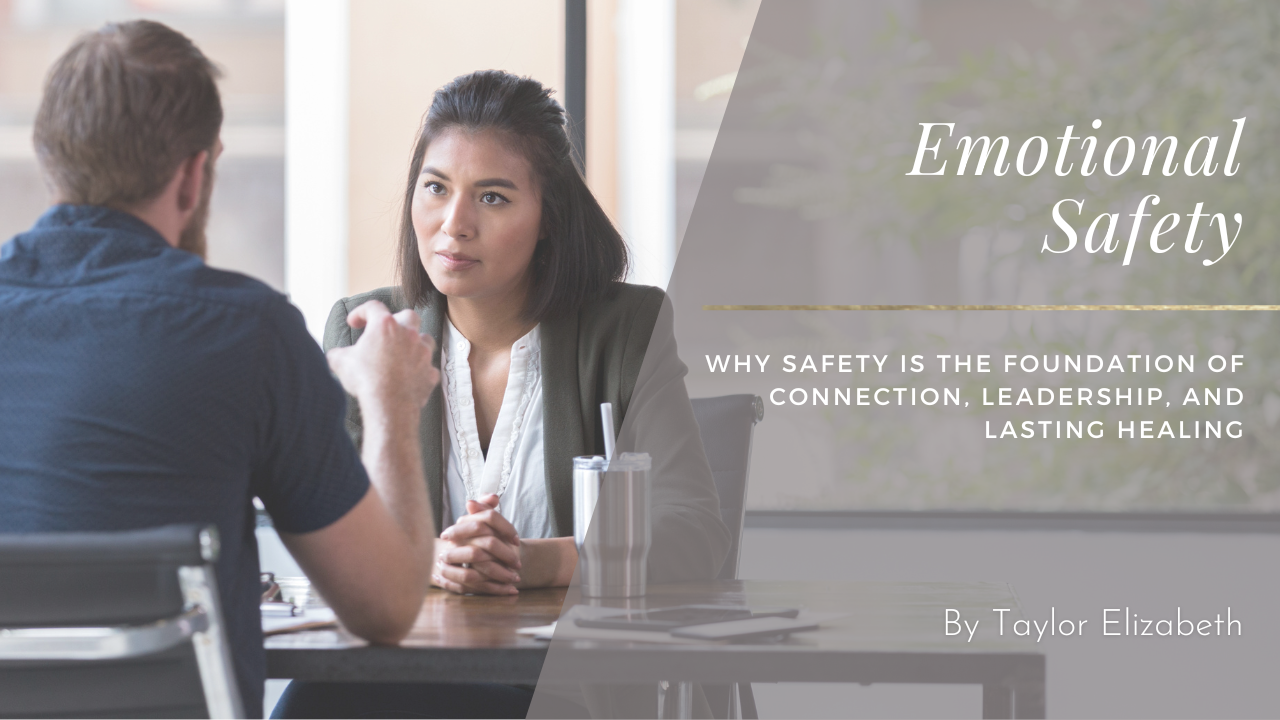Why We Listen When We Feel Safe: The Role of Emotional Safety in Communication, Leadership & Healing
Nov 05, 2025
It wasn’t the first doctor.
Or the second.
Or even the third.
The patient had met with multiple experts, each saying almost exactly the same thing.
Same diagnosis. Same prognosis. Same clinical facts.
But it wasn’t until the fourth professional, a doctor who looked him in the eye, acknowledged the fear behind the silence, and held space without rush or judgment, that something shifted.
For the first time, the patient opened up. He shared more. He asked better questions. He absorbed more information. He trusted. And because he trusted, he listened.
The difference wasn’t in the information.
It was in the emotional experience of the conversation.
And this truth extends far beyond the medical field.
Emotional Safety: The Catalyst for Receptivity
In emotionally intelligent communication, we often talk about what is said. But in reality, the greatest power lies in how it is received.
People don’t just respond to clarity or competence.
They respond to connection.
To tone.
To energy.
To whether they feel judged, or understood.
Neuroscience backs this up. When people feel emotionally safe, the amygdala (our brain’s threat detector) settles. The prefrontal cortex (responsible for rational thinking, decision-making, and learning) becomes more active. In short:
People can’t process information properly when they’re in survival mode.
That’s why empathy isn’t just a soft skill. It’s a leadership imperative.
Why Leaders Need to Understand This
Whether you’re a doctor, CEO, manager, coach, or teacher, your ability to communicate isn’t just about what you say. It’s about the space you create.
And here’s what matters most:
- Do people feel seen in your presence?
- Do they feel like they can speak without defense?
- Do they feel emotionally safe enough to say what they really think, want, or fear?
Because if they don’t, they won’t speak up.
They won’t ask for what they need.
And they won’t tell you the truth, even if it’s costing them progress.
The Mindset Shift: Awareness Over Assumption
When leaders assume “I’ve said it clearly, so it’s understood,” they miss something crucial: communication is never just transactional, it’s relational.
You can give the same message to two people. One hears it, the other doesn’t. The difference? Emotional readiness and trust.
That’s why emotional intelligence isn’t just about self-regulation. It’s also about emotional attunement, the ability to sense where someone is emotionally, and meet them there without losing clarity or authority.
And that begins with awareness.
Awareness of tone.
Awareness of energy.
Awareness of non-verbal cues.
Awareness of your own emotional presence in the moment.
Because the more aware you are, the better you’ll be at creating space for others to show up fully too.
How This Applies to Asking for What You Really Want
So many people don’t ask for what they truly want, not because they don’t know, but because they’ve learned that asking is unsafe. That honesty makes them vulnerable. That openness risks rejection.
But when leaders create environments of psychological safety, something extraordinary happens:
People become more honest.
More collaborative.
More self-aware.
And yes, more open to receiving feedback, support, and even hard truths.
This is the quiet power of emotionally intelligent leadership:
You empower others to become more aligned and aware, not by forcing outcomes, but by creating the conditions for truth to surface.
Final Thought: The Words Might Be the Same, But the Impact Never Is
In any field, whether you're in healthcare, education, business, or service, it’s not just about what you're delivering. It’s about whether the person on the other side feels like they matter in the process.
When people feel safe, they share.
When they feel heard, they soften.
And when they feel seen, they shift.
So, if you want people to change, grow, trust, or take action...
Don’t just speak louder.
Speak kinder.
Speak with presence.
Because you might be saying the same words as everyone else.
But the way you say them?
That’s what transforms resistance into receptivity, and information into impact.
SUBSCRIBE FOR MORE INSIGHTS
Immerse yourself in a curated collection of insightful articles designed to illuminate your path toward personal and professional growth.
An Elegant Perspective is a collection of The Elegance Advisor's insights and coaching offered as a resource to empower you to cultivate the elegance that resides within.
Join us as we explore the art of living gracefully, unlocking your true potential and embracing the elegance that transforms not just how you present yourself, but how you feel every day.
The Elegance Advisor Consultancy will never send you SPAM or sell your information, for any reason.

